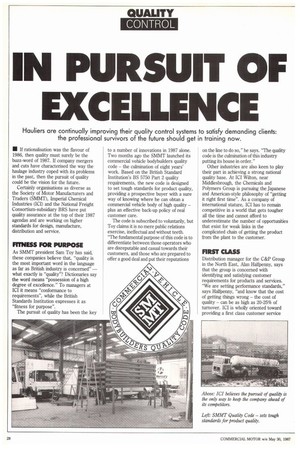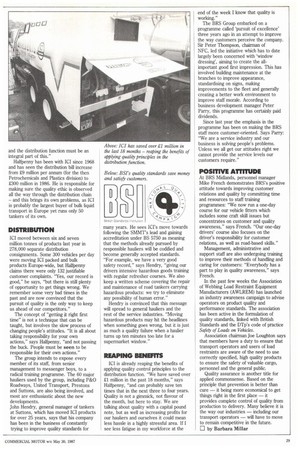IN PURSUIT OF EXCELLENC
Page 30

Page 31

If you've noticed an error in this article please click here to report it so we can fix it.
Hauliers are continually improving their quality control systems to satisfy demanding clients: the professional survivors of the future should get in training now.
• If rationalisation was the flavour of 1986, then quality must surely be the buzz-word of 1987. If company mergers and cuts have characterised the way the haulage industry coped with its problems in the past, then the pursuit of quality could be the vision for the future.
Certainly organisations as diverse as the Society of Motor Manufacturers and Traders (SMMT), Imperial Chemical Industries (ICI) and the National Freight Consortium-subsidiary BRS have put quality assurance at the top of their 1987 agendas and are working on higher standards for design, manufacture, distribution and service.
FITNESS FOR PURPOSE
As SMMT president Sam Toy has said, these companies believe that, "quality is the most important word in the language as far as British industry is concerned" — what exactly is "quality"? Dictionaries say the word means "possession of a high degree of excellence." To managers at ICI it means "conformance to requirements", while the British Standards Institution expresses it as "fitness for purpose".
The pursuit of quality has been the key to a number of innovations in 1987 alone. Two months ago the SMMT launched its commercial vehicle bodybuilders quality code the culmination of eight years' work. Based on the British Standard Institution's BS 5751) Part 2 quality requirements, the new code is designed to set tough standards for product quality, providing a prospective buyer with a sure way of knowing where he can obtan a commercial vehicle body of high quality plus an effective back-up policy of real customer care.
The code is subscribed to voluntarily, but Toy claims it is no mere public relations exercise, ineffectual and without teeth. "The fundamental purpose of this code is to differentiate between those operators who are disreputable and casual towards their customers, and those who are prepared to offer a good deal and put their reputations on the line to do so," he says. "The quality code is the culmination of this industry putting its house in order."
Other industries are also keen to play their part in achieving a strong national quality base. At ICI Wilton, near Middlesbrough, the Chemicals and Polymers Group is pursuing the Japanese and American-style philosophy of "getting it right first time". As a company of international stature, ICI has to remain competitive in a world that gets tougher all the time and cannot afford to underestimate the number of opportunities that exist for weak links in the complicated chain of getting the product from the plant to the customer.
FIRST CLASS
Distribution manager for the C&P Group in the North East, Alan Halfpenny, says that the group is concerned with identifying and satisfying customer requirements for products and services. "We are setting performance standards," says Halfpenny, "and know that the cost of getting things wrong the cost of quality can be as high as 20-25% of turnover. ICI is wholly oriented toward providing a first class customer service and the distribution function must be an integral part of this."
Halfpenny has been with ICI since 1968 and has seen the distribution bill increase from 29 million per annum (for the then Petrochemicals and Plastics division) to 2300 million in 1986. He is responsible for making sure the quality ethic is observed all the way through the distribution chain and this brings its own problems, as ICI is probably the largest buyer of bulk liquid transport in Europe yet runs only 50 tankers of its own.
DISTRIBUTION
ICI moved between six and seven million tonnes of products last year in 278,000 separate distribution consignments. Some 300 vehicles per day were moving ICI packed and bulk products Europe-wide, but Halfpenny claims there were only 132 justifiable customer complaints. "Yes, our record is good," he says, "but there is still plenty of opportunity to get things wrong. We remember some very bad times in the past and are now convinced that the pursuit of quality is the only way to keep us ahead of our competitors."
The concept of "getting it right first time" is not a technique that can be taught, but involves the slow process of changing people's attitudes. "It is all about taking responsibility for your own actions," says Halfpenny, "and not passing the buck. People must be seen to be responsible for their own actions."
The group intends to expose every member of its staff, from senior management to messenger boys, to a radical training programme. The 60 major hauliers used by the group, including P&O Roadways, United Transport, Prestons and Suttons, are also being involved, and most are enthusiastic about the new developments.
John Hendry, general manager of tankers at Suttons, which has moved ICI products for over 25 years, says that his company has been in the business of constantly trying to improve quality standards for many years. He sees ICI's move towards following the SMMT's lead and gaining accreditation under BS 5750 as meaning that the methods already pursued by responsible hauliers will be codified and become generally accepted standards. "For example, we have a very good safety record," says Hendry, "giving our drivers intensive hazardous goods training with regular refresher courses. We also keep a written scheme covering the repair and maintenance of road tankers carrying hazardous products: we try to eliminate any possibility of human error."
Hendry is convinced that this message will spread to general hauliers and the rest of the service industries. "Moving hazardous products may hit the headlines when something goes wrong, but it is just as much a quality failure when a haulier turns up ten minutes too late for a supermarket window."
REAPING BENEFITS
ICI is already reaping the benefits of applying quality control principles to the distribution function. "We have saved over 21 million in the past 18 months," says Halfpenny, "and can probably save ten times that in the next three to four years. Quality is not a gimmick, not flavour of the month, but here to stay. We are talking about quality with a capital pound note, but as well as increasing profits for our hauliers and ourselves it could mean less hassle in a highly stressful area. If I see less fatigue in my workforce at the end of the week I know that quality is working."
The BRS Group embarked on a programme called 'pursuit of excellence' three years ago in an attempt to improve the way customers perceive the company. Sir Peter Thompson, chairman of NFC, led the initiative which has to date largely been concerned with 'window dressing', aiming to create the allimportant good first impression. This has involved building maintenance at the branches to improve appearance, standardising on signs, making improvements to the fleet and generally creating a better work environment to improve staff morale. According to business development manager Peter Parry, this programme has certainly paid dividends.
Since last year the emphasis in the programme has been on making the BRS staff more customer-oriented. Says Parry: "We are a service industry and our business is solving people's problems. Unless we all get our attitudes right we cannot provide the service levels our customers require."
POSITIVE ATTITUDE
At BRS Midlands, personnel manager Mike French demonstrates BRS's positive attitude towards improving customer relations and quality by committing time and resources to staff training programmes: "We now run a one-day course for our vehicle fitters which includes some craft skill issues but concentrates on customer and quality awareness," says French. "Our one-day drivers' course also focuses on the driver's responsibility for customer relations, as well as road-based skills."
Management, administrative and support staff are also undergoing training to improve their methods of handling and caring for customers: "Everybody has a part to play in quality awareness," says French.
In the past few weeks the Association of Webbing Load Restraint Equipment Manufacturers (AWLREM) has launched an industry awareness campaign to advise operators on product quality and performance standards. The association has been active in the formulation of quality standards, linked with British Standards and the DTp's code of practice Safety of Loads on Vehicles.
Association chairman Joe Loughton says that members have a duty to ensure that transport operators and users of load restraints are aware of the need to use correctly specified, high quality products to ensure the safety of valuable cargo, personnel and the general public.
Quality assurance is another title for applied commonsense. Based on the principle that prevention is better than cure — it being more economical to get things right in the first place — it provides complete control of quality from production to delivery. Many believe it is the way our industries — including our transport operators — will have to move to remain competitive in the future. 0 by Barbara Millar












































































